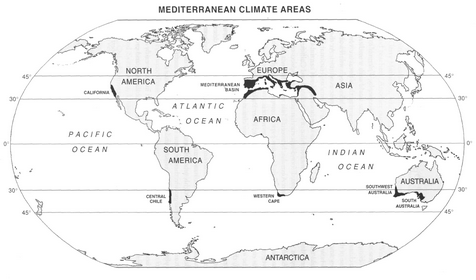|
Climate/Weather
Los Angeles’s coast is one of five Mediterranean climates found around the world. Plants from any of these 5 regions have similar adaptations that allow them to thrive here. Once established, most Mediterranean-type plants survive with little water and low humidity. The Plant List contains a majority of California native and Mediterranean plants. (To access the Plant List, return to the Main Menu.)
Choose plants from the regions shaded in black: Southern California coast, Central Chile, the Mediterranean, Southwest Australia and South Africa (Western Cape):

The following are useful weather facts and tips:
| • | South-facing walls and patios absorb heat during the day and radiate the heat at night, warming nearby plants. |
| • | Provide shade for west-facing windows with deciduous trees or trellises. A mature tree can reduce summer air-conditioning costs up to 40 percent (See Sunset publication, Smart Water and Energy Use in the West). |
| • | Paved areas and air conditioners should be shaded to provide further energy savings. |
| • | A cold, dry wind can damage unprotected plants causing stunted or slow growth. Create sheltered garden areas for protection regardless of wind direction. |
Weather/climate terms:
| • | Aspect: The direction a garden faces (north, south, east, or west). |
| • | Exposure: The direction of a garden with respect to weather. For example, the garden has a northern exposure if it is exposed to cold north wind with occasional frost. |
| • | Microclimate: A small area with uniform climate located within a larger area. Hills, hollows, and structures can create microclimates. |
|
